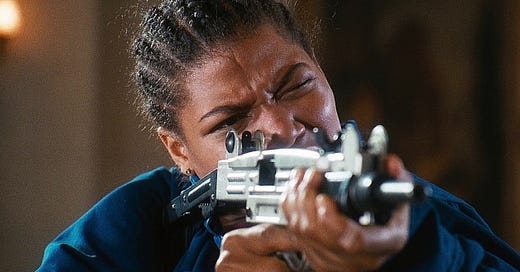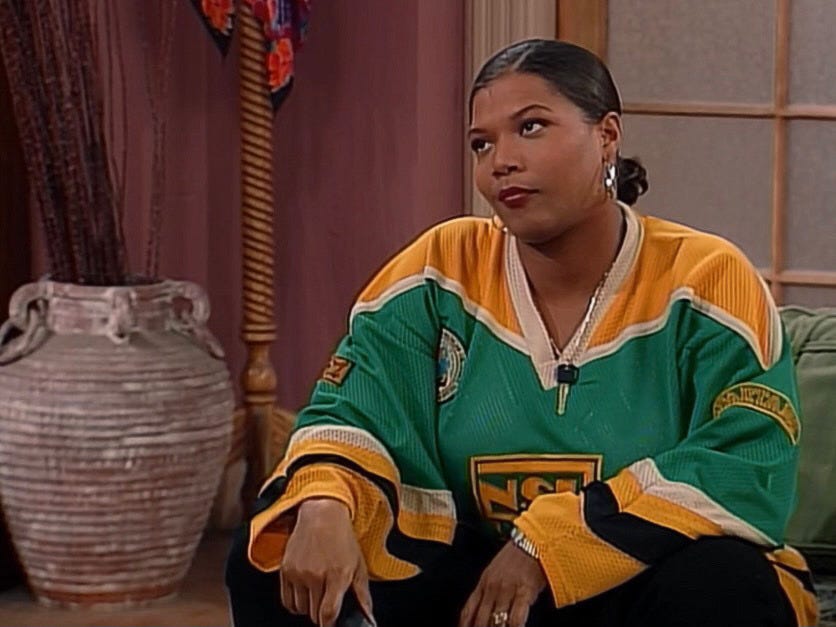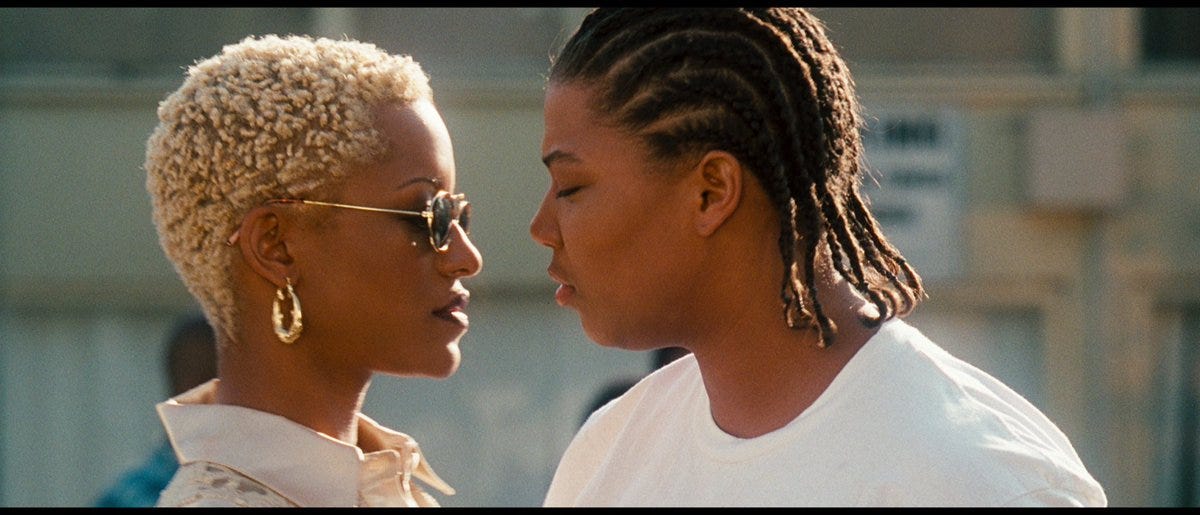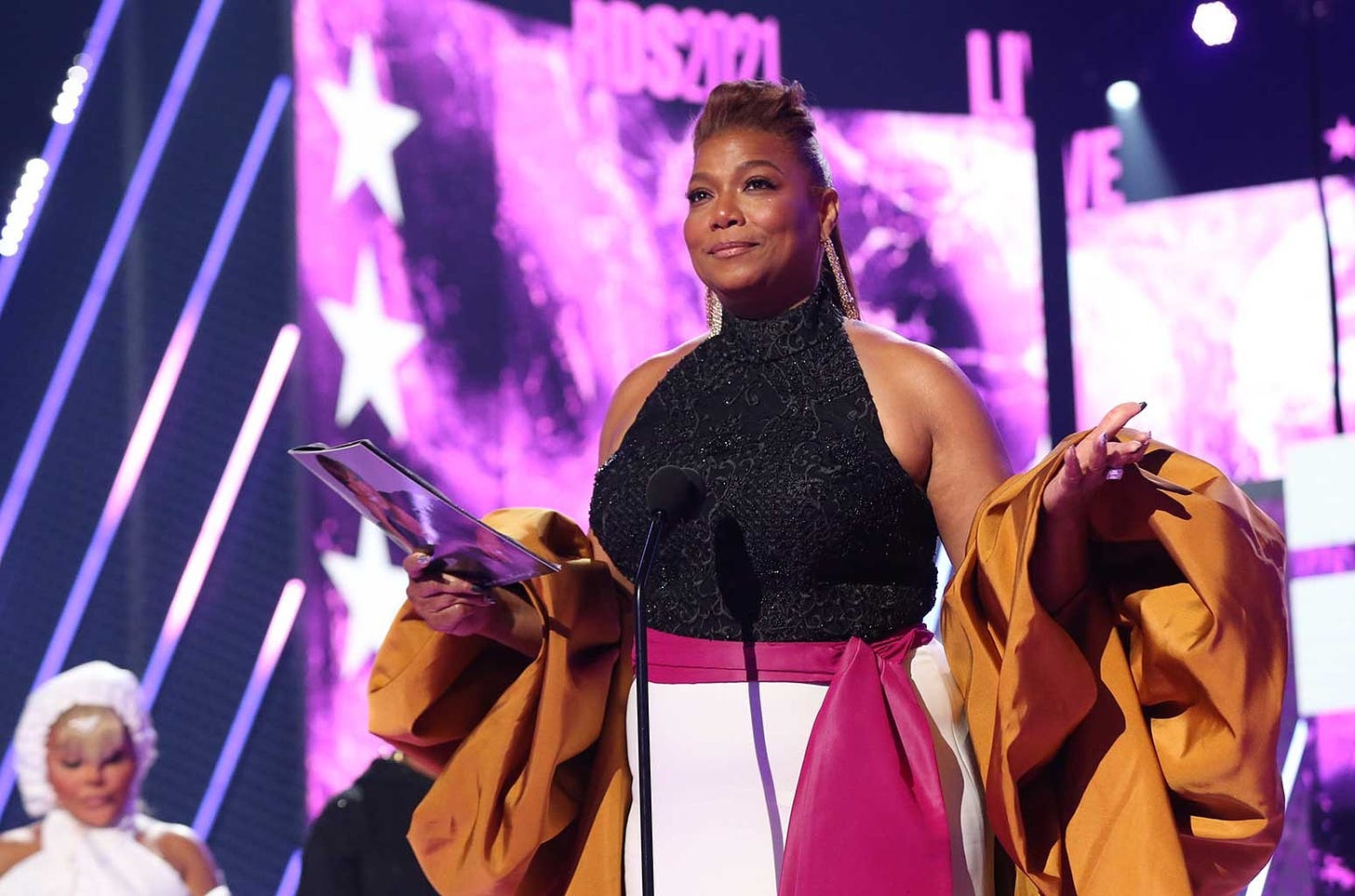This is the Sunday Edition of Paging Dr. Lesbian. If you like this type of thing, subscribe!
Queen Latifah – born Dana Owens in Newark, New Jersey – has long been considered a lesbian or queer icon, despite (until recently) never confirming that she herself is queer. For much of Latifah’s long, varied career (in music, film, and television) she has remained resolutely vague about her personal life, while at the same time playing a number of iconic queer roles and twice as many straight ones. Indeed, one of the reasons I wanted to include Latifah in this “Anatomy of a Lesbian Icon” series is because of how she differs from some of the other icons I’ve mentioned – those who are beloved in part because of their colorful queer dating history (Kristen Stewart, Cara Delevigne) or those who are ostensibly straight but play queer roles (Rachel Weisz, Cate Blanchett).
It has long been rumored that Latifah is queer – from paparazzi shots of her with women to the time she referred to Pride attendees as “her people” – but it wasn’t until this year’s BET awards, during which she accepted the Lifetime Achievement Award, that such speculation was more explicitly confirmed. During her speech, Latifah thanked “Eboni, my love. Rebel, my love,” her rumored partner and the son they share together. Though Latifah has not made any more statements since then, her speech confirmed what had long been suspected, if not already known, as Latifah was clearly ready to share that information on her own terms.
Nonetheless, Latifah has been a queer icon long before the awards this summer. Though she has been “ambiguous” about her sexuality for some time, it has never diminished her legend. How then, do we read Latifah’s icon status with this context in mind? Does it matter that she has never really “officially” come out? The answer, I would argue, is no.
In many ways, Latifah’s career speaks for itself. In 1989, at the age of 19, Queen Latifah released her debut album All Hail The Queen, which featured the hit single “Ladies First.” Latifah would go on to release four more rap albums along with two jazz albums and become the first female rapper to be nominated for an Oscar.
Latifah’s first acting role was a small part in Spike Lee’s 1991 film Jungle Fever, but her biggest role came in 1993 when she played Khadijah on the sitcom Living Single. Though Khadijah was certainly written as heterosexual and had plenty of romantic prospects in the show, she was also very focused on her career and never lowered herself for a man, embodying the same type of strength and confidence as Latifah-the-rapper. Indeed, Khadijah’s masc-of-center style and the way the character often overlapped with Latifah’s own persona – such as the episode1 where the music video for Latifah’s U.N.I.T.Y. plays at the end – make the text a particularly rich one. (Latifah even wrote and performed the show’s theme song).
Moreover, Living Single itself was fairly progressive in its views on queer issues for the time. One episode2, which aired in 1996, even featured a soon-to-be-married lesbian couple who were actually supported by the main cast (by Latifah’s Khadijah perhaps most of all). Though none of the main characters were actually queer, the show nonetheless had queer appeal. Lester Fabian Brathwaite writes that “its four female protagonists didn’t simply have queer sensibilities but also queer-identifying markers that, to queer audiences of color, were like manna from heaven in ’90s television’s otherwise arid desert of representation.”
Latifah’s first explicitly queer role came in 1996 when she starred as Cleo in F. Gary Gray’s Set It Off. The film – which also stars Jada Pinkett Smith, Vivica A. Fox and Kimberly Elise – follows a group of women who decide to rob a bank after an act of police brutality and a horrific encounter with CPS. Latifah’s Cleo is a brash, confident butch lesbian (also known as a “stud” in black lesbian parlance) who comes up with the initial idea of the heist. Though (spoiler alert) Cleo does not make it out in the end, she goes out in a blaze of glory, refusing to give in to the system that is out to get her.
As Carmen Phillips writes in Autostraddle, Cleo was a revelation to black queer women, and no one else but Latifah could have done the role justice. “Young, mighty, unadulterated, sweet to her friends, sexy in the way that only studs can be — an energy that radiates beneath the pores and melanin; the quiet, intoxicating confidence that comes from truly owning your shit. It’s almost too perfect that they cast the Queen, because she truly sees Cleo’s royalty.” Though Latifah has spoken about her initial hesitation in taking the role – mainly because she didn’t want her family members taking flack for it – she nonetheless remained steadfast in her commitment to portraying Cleo in all her black, queer, glory.
Another important role for Latifah was 2015’s Bessie, in which she played queer blues icon Bessie Smith. The HBO film is directed by Dee Rees, a black lesbian who also directed the excellent lesbian film Pariah. Bessie is explicit in its depiction of Smith’s queerness, and Latifah plays the role with gutsy strength. (Mo’Nique’s wonderful portrayal of queer matriarch Ma Rainey is also noteworthy). As Phillips writes, the film is a “stunning testimonial to black queer women artists who live — and die — by their own defiant rules.” In her research for the film, Rees looked to scholarship about the era, such as Angela Davis’ seminal Blues Legacies and Black Feminism. Latifah too did extensive research in order to inhabit the part, once noting, “I’ve seen so many things in Bessie’s life that really mirrored mine.” Though Latifah did not in fact “come out” following the release of this movie, her and Rees’ commitment to the film and the queer history it uncovers is admirable, and telling.
Latifah has played other queer roles in her career, such as Mama Morton in Chicago and Hattie McDaniel in Ryan Murphy’s Hollywood, as well as a particularly queer production of the musical The Wiz. Beyond this, Latifah’s career has been impressively expansive. She has been a hugely impactful figure in the world of rom-coms with roles in films such as Bringing Down the House (2003), Beauty Shop (2005), Last Holiday (2006), and Just Wright (2010), and as Cate Young notes in Bitch, “Latifah has repeatedly demonstrated that plus-size Black women can and do find love onscreen.” Latifah also had her own talk show – The Queen Latifah Show – and has starred in numerous musicals, such as the aforementioned Chicago and the 2007 remake of Hairspray.
Despite this remarkably impressive career, commentators have long been confused by Latifah’s status as a (queer) cultural icon, and she has frequently been spoken about in a condescending manner in the press. As one commentator wrote on Medium, “Latifah's public profile exists somewhere between gay ally and actual gay.” In an oft-quoted New York Times profile from 2008, Latifah rightfully and eloquently maintained her right to privacy after being asked about her sexuality once again, asserting that “You don’t get that part of me...nobody gets that. I don’t feel like I need to share my personal life, and I don’t care if people think I’m gay or not. Assume whatever you want. You do it anyway.”
But does it really matter whether Latifah has confirmed or denied her sexual orientation? Apparently, it does, according to cultural critics who largely ignore Latifah when discussing the lineage of queer female rap, or that of queer media more broadly. This, I think, is wrong. Though Latifah’s apparent evasion about her personal life might appear to make her own sexuality ambiguous, her formidable presence as a black woman in Hollywood has never been anything but audacious. Her residence in pop culture – particularly through her incredible and influential rap career – has always been unequivocal, confrontational even.
As scholar Lauren Herold puts it, “whether or not Queen Latifah ever discusses her sexuality in a public way, she is not “hiding” her dedication to LGBTQ communities and Black queer history.” Despite never publicly “coming out,” Latifah has consistently and steadfastly supported the queer community through her film, television, and musical projects, beginning back in the 1990s when it was decidedly less popular (and less profitable) to do so. This support has never been ambiguous, and Latifah has deserved a place in the queer hall of fame long before she stood on that stage in June.
Season 1 Episode 23, “Five Card Stud”
Season 3 Episode 22, “Woman to Woman”









